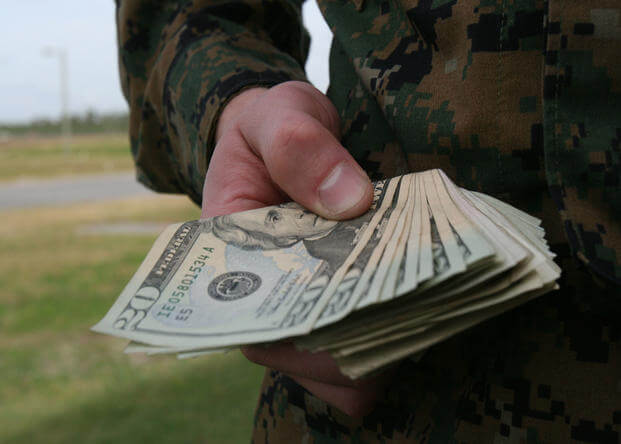This article originally appeared on Task & Purpose, a digital news and culture publication dedicated to military and veterans issues.
The day has finally arrived. You sprint out of the company office, bounding across the grass as SNCOs and boot-tenants holler to “stay off the daggum grass.” But it doesn’t matter. You’ve made it. You’re untouchable. You’re free. You have your DD-214, and your last paycheck burning a hole in your pocket. Time to hop in that Ford F-150 that you financed at 20% and roar past the base gates for a road trip back to your hometown.
Two weeks later, you’re flat broke, credit card debt is eating away at your Post-9/11 G.I. Bill housing allowance, and you’re sharing a one-bedroom apartment with three other people and sleeping on a yoga mat.
Don’t be this guy. Leaving the military can be tough enough without adding money troubles to the mix. Task & Purpose spoke with a couple of financial experts and veterans to glean some helpful tips for avoiding post-service poverty.
Seriously, set up a rainy day fund.
“There’s no such thing as job security in the civilian world, not like there is in the military,” Curtis Sheldon, the lead financial planner and president of C.L. Sheldon & Company and a former Air Force fighter pilot told Task & Purpose. “On any given day you can be shown the door, not because you did anything wrong, but because the company is doing something different.”
Which makes a “rainy day fund,” “war chest” or a “oh shit, thank God I have some cash squirreled away” account a really good idea.
Okay, so now that your heart rate is up, let’s bring it back down. Here’s what you need to do:
Before you get out, start saving. Yes, every month.
Try to save about 10% of your monthly income; here’s a pro tip: Set up automatic payments or deposits so that money goes into savings before you can spend it all on liquor and cases of beer at the base exchange.
Continue squirrelling away cash until you have about six months to a year’s worth of living expenses stashed away. Keep in mind, this money is in that unpleasant-to-think-about, but important-to-plan-for event that your job suddenly disappears once you’re a civilian, or you have some other unexpected expense. It is not for last-minute tickets to Vegas for a reunion with the boys from 3rd Platoon.
“At this point, you’re not going out to eat dinner and going to movies, you’re paying the rent and keeping the lights on while you look for a job,” Sheldon told T&P. “You don’t want to take any risk with that money or any chance of it going down in value, so you’re probably looking for a savings account, or you could potentially look for shorter term certificates of deposit at a bank to get a little bit better interest.”
Civilian life comes with a lot of freedom and a lot of costs.
Leaving the service and moving out of the barracks doesn’t just mean you can grow out those long beautiful locks or that bushy face rug; it also means rent, utilities, food, and insurance — auto, health, dental, life — are all on you.
“Understanding your cash flow needs is one of the most important steps you can take toward financial independence,” explained Ryan Guina, an Air Force veteran, guardsman and the founder of The Military Wallet, a financial news site geared toward service members. “Knowing your cash flow needs after leaving the military can be difficult because there will be some expenses you can’t predict, such as the cost of healthcare, which is covered while on active duty. So in some cases you will need to make an estimate until you have hard numbers to work with.”
Which means balancing a budget, like a boring adult.
One way to help you plan for the new expenses is to start tracking how you spend. To get a feel for just how much cash you leave on the (disturbingly sticky) dance stage at the local strip club, try out an expense tracker. The tracker sorts your monthly payments and purchases into categories like: groceries; entertainment; utilities; and travel. Many banks offer this as part of their online checking services, but there are some other options, like Mint, which will track your spending for you.
“So as you’re getting out, or even while you’re still on active duty, look at what you’re spending going out, what you’re spending on groceries, if you’re living out in town,” Sheldon told T&P. “That would at least give you an idea on what your discretionary spending money is. That might help.”
Pay off that credit card debt before you get out.
The more expenses you have chipping away at your income month-over-month, the less cash you have in your wallet. Obvious, right? That’s why it’s a good idea to start cutting down your debt while things like rent, health insurance, and even food are covered by Uncle Sam.
Or, if you can’t control yourself, just don’t use a credit card.
“The most important aspect of credit card use is to know yourself,” Guina told T&P. “I know many people who swear off credit cards, because they know they can’t control your spending. I know just as many people who only use credit cards because of convenience, security, and rewards. But they always pay the balance in full. If you are in the first camp, then lay off the credit cards, and pay cash or use a debit card. If you are in the latter camp, then keep up the good work.”
Pack light.
As your departure from the military draws near, take a quick inventory of your room. If your wall locker or closet looks like a storage shed from Hoarders, then you might want to take a trip to the nearest pawn shop to start hocking some of that crap. Sure, the military will cover your first move as you leave, but that’s it. If you pull up stakes again, paying for it is on you.
“As a rough rule of thumb, if you pay someone to move your stuff it’s somewhere around $1 a pound to move it, and you could do it cheaper with a U-Haul,” Sheldon explained. But even if you rent a truck and drive the stuff yourself, “you’re probably looking at $0.25 or $0.50 a pound to move it with a U-Haul and that starts making a lot of that stuff really expensive.”
If you’re going to college, you may be eligible for other bennies beyond just the G.I. Bill.
While the Post-9/11 GI Bill is an incredible benefit, it may not cover 100% of tuition for every university, especially those high-priced private colleges. Consider looking into the Yellow Ribbon Program as a way to earn your degree without breaking the bank or taking loans.
Additionally, many states offer education grants to vets attending local schools. “Most colleges and universities have a veterans resource center or an office that specifically works with veterans using the GI Bill or other scholarships and grants,” Guina told T&P. “They can help you learn which programs or benefits you may qualify for, and many will even help you complete the paperwork and apply for the benefits.”
More articles from Task & Purpose:
Taliban Fighters Massacre Scores Of Afghanistan Security Forces — Again
We Salute The Coast Guard NCO And Army Vet Who Both Saved Drowning Civilians
6 British Sailors Arrested In Florida For Drunk And Disorderly Behavior




